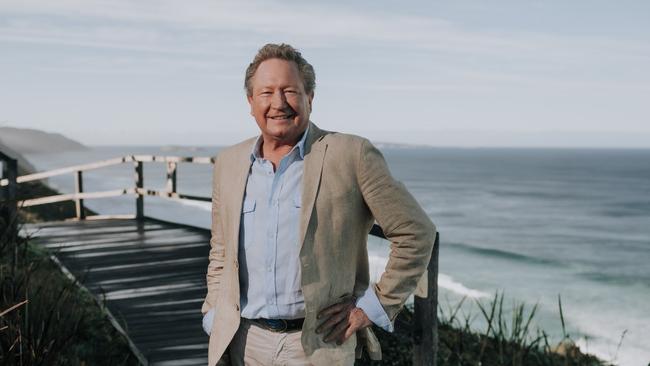Andrew Forrest’s $66bn green dream retreat
Fortescue Future Industries strikes preliminary $66bn deal with a German company to provide a third of its energy imports.

Fortescue Metals Group has been forced to walk back comments made by chairman Andrew Forrest that a major German hydrogen project could cost $US50bn ($66bn) after the ASX queried the company’s lack of disclosure to investors.
The iron ore company’s hydrogen arm, Fortescue Future Industries, agreed to a deal with Germany’s E. ON to provide five million tonnes a year of green hydrogen by 2030, with the first 200,000 tonnes due by 2024-25.
The pact was seen as a way to help Germany deal with Russia’s war on Ukraine, which has squeezed energy supplies across Europe.
Mr Forrest said earlier on Wednesday “on both sides we will be like a duck swimming; you and I will be really calm but underneath our organisations, they will be going like crazy, because it’s a minimum $US50bn expenditure.”
Fortescue has now clarified that there “was no commitment to this expenditure” and final investment decisions would be at the sole discretion of the company’s board.
“The expenditure described is a high-level assessment by the chairman of what such a major project may cost and is appropriate in the environment the statement was made to provide context and scale of the potential of the MOU,” Fortescue said in an ASX statement.
“There is widespread investor interest in FFI across the full spectrum of investors, ranging from retail through institutional investors and sovereign wealth funds, and across the capital structure.”
While Fortescue has committed to spend 10 per cent of its net profit on FFI, the amount of capital needed to deliver projects has stoked growing concerns among some of the company‘s major investors and analysts about the speed and scale of FFI’s global commitments as well as the projected return on investment.
The move by the ASX shows the magnate’s fondness for spouting huge budgets for as-yet-un-costed projects has caught the attention of the exchange operator as it increasingly clamps down on poor transparency.
Analysis by The Australian last year showed Fortescue would need to find about $195bn to make good on all the promises made so far by Mr Forrest on his global green energy spree.
While the company maintains its position that it will make full market disclosures when final investment decisions are made on green energy projects, capital estimates worth more than $US145bn have been put on the public record.
FFI is on a self-imposed deadline to find, develop and build assets capable of supplying 15 million tonnes of hydrogen a year by 2030 – an enormous task, under any circumstances.
Sections of Wednesday’s deal were binding to find optimal solutions for green hydrogen delivery and both companies committed to agree on a long form deal.
When Dr Forrest’s company fulfils the five million order for E. ON, it will replace one-third of the country’s current gas and oil imported from Russia.
Such was the urgency from Germany to source alternative means of energy rather than continue sending millions of dollars to Russia, and under increasing political pressure from the US and the United Kingdom, that the deal, one of the biggest energy plans agreed, took just a month to get up.
FFI, which has a workforce of 800, will rapidly expand, with the German deal providing thousands of initial jobs and then tens of thousands once the hydrogen is being produced – should the deal go ahead.




To join the conversation, please log in. Don't have an account? Register
Join the conversation, you are commenting as Logout